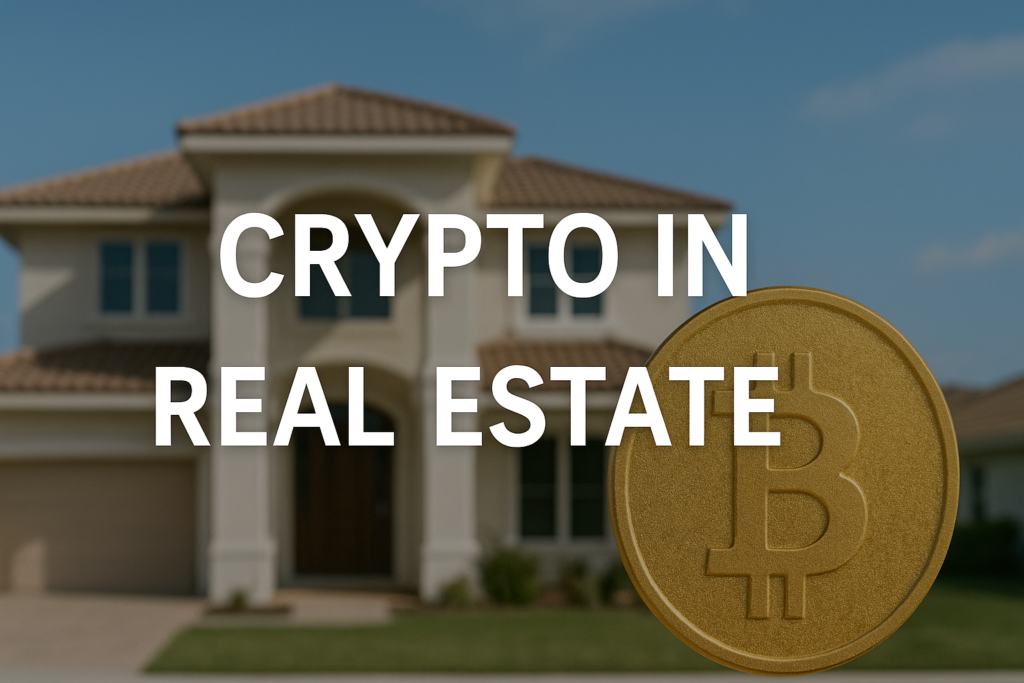Crypto Real Estate in Miami – Explained

The New Normal: Crypto and Real Estate Converging
Why Miami Leads the Charge
Miami has rapidly transformed into a crypto-friendly real estate hub. Local policies and high-tech momentum, along with influential voices like Mayor Francis Suarez advocating for digital currency adoption, have put Miami at the forefront of this shift.
Developers like Property Markets Group (PMG) now allow prospective buyers to submit deposits using Bitcoin or Ethereum via a vetted and compliant crypto-to-USD payment system, powered by payment provider Shift4. Buyers complete a crypto addendum and KYC process; Shift4 converts assets into dollars and transfers directly to the developer—eliminating volatility risk for all parties.
As of mid‑2025, approximately 30% of ultra-luxury property deals in Miami have embraced blockchain or crypto protocols in one form or another, and crypto-backed transactions now represent roughly 7–10% of high-end residential sales in key Florida markets.
Real Transactions: Crypto‑Enabled Deals in Action
PMG + Shift4: Crypto for Pre‑Construction
PMG’s crypto initiative spans multiple prestigious developments:
- Waldorf Astoria Residences, Miami and St. Petersburg
- One Twenty Brickell, Miami
- E11EVEN® Club Residences, Beyond
- Sage Intracoastal Residences, Fort Lauderdale
- 38 West Eleventh, Wynwood, Miami
Buyers can reserve units using crypto, which Shift4 immediately converts to USD—PayPal‑style convenience with crypto-level wealth.
Wallet-to-Wallet Miracle: The Rider Residences Case
Miami’s first documented wallet‑to‑wallet condo sale closed without fiat currency. A studio at The Rider Residences sold for $528,900 paid entirely in Bitcoin—no intermediary conversion or banking required. The buyer used a private wallet; the seller received USD-equivalent value instantly. This streamlined, KYC-compliant process proves crypto can be both private and secure.
Ultra-High-End Demand: Crypto Billionaires Buying In
Tech entrepreneur Daniel Nadler paid $38.2 million in cash for a beachfront Four Seasons penthouse in Surfside. Although not directly paid in crypto, the deal highlights Miami’s allure for digital-asset holders who prefer fast, discreet cash transactions over traditional mortgages or listings. Such buyers often hold substantial crypto portfolios.
Meanwhile, TechCrunch founder Michael Arrington recently purchased a $60 million Miami Beach home with cash—though closely tied to his crypto-fueled wealth — underscoring the real purchasing power in this cohort
How the Crypto Process Works (For Buyers, Sellers & Developers)
Step-by-Step: Crypto-Powered Real Estate Deals
- Buyer expresses interest in a crypto-friendly offering
- Buyer signs a crypto transaction addendum
- KYC and AML verification via Shift4 or similar provider
- Buyer transfers crypto to a secure wallet
- Shift4 converts cryptocurrency into USD instantly
- Funds wired to developer or escrow
- Titles and contracts proceed as a standard U.S. real estate transaction
This process ensures developers receive USD, protecting them against crypto volatility. Buyers use their digital assets without uncertainty or cumbersome conversions
What This Trend Means for You
For Luxury Property Sellers
- Label your listing as “crypto-friendly” to attract global, tech-savvy buyers
- Lead with secure, regulatory-compliant messaging about KYC and shift-to-dollar conversion
- Position your asset as modern, data-forward, and performance-oriented
For Crypto-Native Buyers or Investors
- Gain access to exclusive pre-construction incentives, price locks, or early-bird selections
- Leverage blockchain for streamlined transaction with enhanced privacy and speed
- Avoid timing risk by using direct payment platforms backed by USD conversion
For Traditional Buyers or Sellers
- Stay informed—crypto buyers set trends that influence overall market pricing and liquidity
- Understand tokenization, smart contracts, and blockchain’s role in ownership transfers and escrow
Emerging Trends Beyond Direct Crypto Sales
Tokenization and Fractional Ownership
Platforms like Lofty, RealT, and Coinspaid now allow fractional property ownership through token offerings. This provides liquidity and access to high-end Miami assets for mid-tier investors—especially appealing to those with limited capital or who hold stablecoins.
Tech Integration: Smart Homes, VR, and AI
By 2025:
- 30% of new Miami luxury homes are equipped with IoT systems for automated energy, security, and wellness control
- VR property tours sell 31% faster and at 9% higher prices
- AI tools help price listings dynamically and predict emerging neighborhoods (e.g., Coconut Grove, Brickell) before mainstream appreciation.
These innovations appeal especially to digital-asset holders looking for modern, frictionless investments.
Risks & Practical Considerations
Legal & Tax Implications
Crypto is treated as property by the IRS; transactions can trigger capital gains tax if your holdings have appreciated significantly. Value at moment of transfer becomes taxable—making timing, record-keeping, and advice critical.
Volatility & Pricing Structures
While Shift4 platforms convert crypto at the time of transaction, large price swings before conversion can influence final USD value. Sellers may insist on buffer pricing or valuation thresholds.
Regulatory & Compliance Oversight
Expect KYC/AML protocols even for wallet-to-wallet designs. Traditional lenders typically don’t allow direct crypto down payments—conversion to USD is standard for escrow compatibility.
Platform Risks
Tokenization and fractional ownership platforms operate under evolving SEC guidelines. Many real estate tokens are considered securities and must adhere to Reg D, Reg A+, or Regulation S exemptions investor vetting is vital
FAQ — Crypto Meets Real Estate
Q: Can crypto replace cash or financing in any listing?
Only if the seller and developer explicitly accept it. Most deals remain USD-based; crypto is converted during closing.
Q: Is blockchain-backed title recording legal in Florida now?
Pilot programs exist, but most title transfers still use traditional record systems. Blockchain titles may grow but are not yet mainstream.
Q: Can I make an offer in crypto if I don’t actually own crypto?
No—offers must reflect assets you legitimately control. Lenders require proof and value stability before accepting crypto as collateral.
Q: Do I get better pricing through crypto offers?
Sometimes developers offer incentives (discounts, early access) for crypto-enabled sales, especially in pre-construction phases.
Final Insight: Miami’s Real Estate Evolution
Miami’s embrace of crypto real estate is a tangible trend—not just a novelty. As more high-net-worth buyers with digital asset holdings direct funds into local luxury developments, the city is crafting a model for transparent, fast, and global-capital-friendly real estate.
- Sellers: Adapt to attract new buyer pools
- Buyers: Leverage compliance and crypto tools for smoother deals
- Everyone: Stay data-smart, tech-forward, and legally sound
Want to Go Further?
We can help with:
- Listings or developers that accept crypto
- Buyer consultation on KYC, conversion fees, and deal preparation
- Crypto-savvy strategy for luxury sellers looking to stand out
Just click on “Contact Us” and fill out the form —we’ll reach out to you to help you out.
Ashley & Esmil Realty — bringing clarity, strategy, and edge to a changing market
📚 Sources & Citations
-
Forbes
How Crypto Is Changing the Luxury Real Estate Market in Miami
https://www.forbes.com/sites/forbesbusinesscouncil/2025/06/12/how-crypto-is-changing-luxury-real-estate-miami -
Bloomberg
PMG Accepts Crypto for Waldorf Astoria Residences in Miami
https://www.bloomberg.com/news/articles/2025-03-15/pmg-opens-crypto-deposits-for-new-miami-condo-project -
CoinDesk
Crypto Adoption in Real Estate Grows in Florida Luxury Markets
https://www.coindesk.com/business/2025/05/22/crypto-adoption-real-estate-miami-florida -
Inman Real Estate News
What You Need to Know About Accepting Crypto as a Seller
https://www.inman.com/2025/04/02/crypto-sellers-legal-tips-florida -
Realtor.com Research
Tokenized Real Estate and Smart Contracts: What’s Legal in 2025?
https://www.realtor.com/news/trends/tokenized-property-ownership-legal-issues-2025/ -
Miami Herald
South Florida’s Crypto Boom Spurs Blockchain-Enabled Closings
https://www.miamiherald.com/news/business/real-estate/2025/06/10/crypto-closings-miami -
PMG (Property Markets Group)
Crypto at PMG Developments: FAQs and Process Overview
https://www.propertymg.com/crypto-faq/ -
Shift4 Payments
Real Estate Crypto Conversions for Developers and Title Companies
https://www.shift4.com/crypto-real-estate/ -
IRS.gov
Virtual Currency and Tax Guidance (Capital Gains Rules)
https://www.irs.gov/businesses/virtual-currencies
